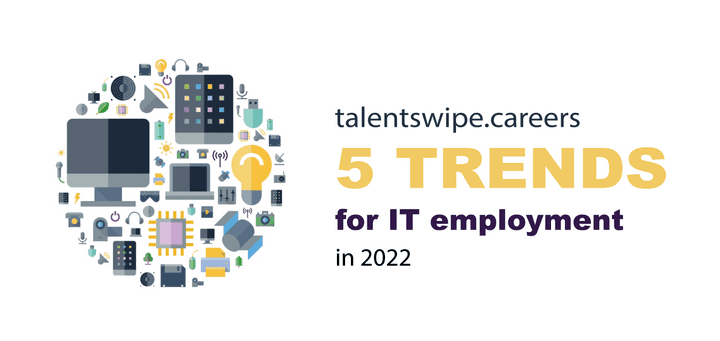For many individuals and organizations, the most important lesson of the last two years or so has been that truly transformative change isn’t as difficult to implement as might have once been thought, if the motivation is there! As a society, we will undoubtedly continue to harness this newfound openness to flexibility, agility, and innovative thinking, as the focus shifts from merely attempting to survive in a changing world to thriving in it.
Technologies such as artificial intelligence, cloud computing, data analytics, and machine learning have been growing rapidly over the years. With the rise of the pandemic and the global health crisis, they have become essential in today’s society.
Here are 5 IT employment trends for 2022:
1. Data Scientist
Data science is multi-faceted, combining two or more academic disciplines, such as math, statistics, visualization, advanced computing, domain expertise, scientific method and data engineering. The practice of data science incorporates data mining, machine learning and big data and involves scientific methods, processes and algorithms to discover insightful ways to interpret and use structured and unstructured data. Data science skills can help you in a career as a data scientist, machine learning engineer, enterprise architect and statistician. A data scientist should be able to understand Machine Learning algorithms; create data models Code in language like Python, R, SAS and other analytical tools; identify business issues and provide appropriate solutions.
2. Blockchain Engineer
Blockchain is another technology that is causing impacts in a variety of areas, including healthcare, insurance, real estate, manufacturing, and the financial sector. Start-ups, legacies, IT corporations, and governments are the four primary stakeholders in the crypto job market. Crypto professionals are in high demand as consultants and advisors by national governments. A blockchain engineer specializes in developing and implementing architecture and solutions using blockchain technology. From a birds eye view a blockchain engineer should have solid programming skills and a thorough understanding of the technologies behind Ripple, R3, Ethereum and Bitcoin as well as consensus methodologies and the security protocol stacks, crypto libraries and functions. Blockchain developers use blockchain skills in combination with skills in cryptography, data structures, algorithms and computer networking.
3. Cloud computing
A cloud engineer is responsible for building and maintaining your company’s cloud infrastructure, where data is stored. They have a strong knowledge of operating systems like Windows and Linux. Usually, they work closely with DevOps engineers and Database administrators. Cloud computing skills are useful in careers as a full stack developer, senior software engineer, cloud engineer, Java developer and software architect. Cloud architects are in charge of delivering, administering, and maintaining cloud applications, as well as overseeing the company's cloud computing strategy. In addition to networking, programming, and security expertise, cloud architects often have a deep understanding of several operating systems. Enterprise IT architect, Cloud Security Engineer, or Cloud Analyst are just a few of the popular roles in cloud computing.
4. Cybersecurity
With the expansion of the internet, there is a growing threat to online security. This has resulted in the creation of cybersecurity employment in all of the main industries. For systems, network, data, and cloud security, this position is in high demand, and IT experts in this field start and maintain security measures to keep IT systems secure from external threats and security breaches. They must guarantee that regulations and protocol are followed, and proof of management of security audits, vulnerabilities and threats to systems, communication and execution of policies and procedures, and understanding of laws and regulations are all examples of common capabilities. Network administrators, IT managers, security engineers, systems administrators, and security consultants, among other positions, are in great demand for those with cybersecurity certification. Cybersecurity-focused jobs include systems engineer, network engineer or architect, software developer or engineer and cybersecurity analyst.
5. DevOps Engineer
DevOps engineers are often in charge of IT infrastructure, resource provisioning, software testing, and post-release monitoring. These employees assist in the simplification of code upgrades, allowing businesses to constantly tune and optimize operations for maximum efficiency. A DevOps engineer supports software developers during the development process by providing access to the server for any new additions to the team and other resources they may need. After a launch, their job is to maintain the product life cycle, providing necessary technical support. The ideal DevOps engineer will be familiar with git and git workflows; have a working knowledge of databases and SQL; knowledge of Ruby or Python programming languages.
If you're interested in pursuing a career in the technology industry in Romania, here's a list of interesting jobs you may consider:
Bibliography:
https://www.simplilearn.com/highest-paying-tech-jobs-article https://www.simplilearn.com/top-technology-trends-and-jobs-article https://www.analyticssteps.com/blogs/most-demand-technologies-2022 https://www.daxx.com/blog/development-trends/in-demand-tech-jobs https://edyoucated.org/blog/best-skills-for-employees https://smallbizclub.com/run-and-grow/top-7-it-jobs-in-demand-in-2022/ https://www.indeed.com/career-advice/career-development/in-demand-tech-skills

